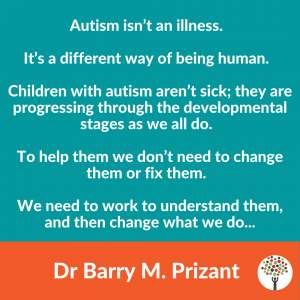When we think of a child with additional needs, challenging behaviours, special needs or delayed development – what do we think? Do we think ‘what can we learn from them’, ‘how fascinating’, ‘how amazing to see the world differently from everyone else’, ‘how can they enhance my life?’ Probably not. It’s more likely that we think or see barriers, we see problems, we see how this will affect the way we work, our ratios, the time we need to give for support, the possible referrals process and the challenges the child will be facing.
But what if we started to think about what we gain from being with a child with autism? How could this change the way we think, the way we respond to them, our connections with them and their family and the personal development potential for us as educators?
Consider for a moment a child aged 3, non-verbal, limited eye contact, not a huge fan of transitions or having other children near them and only eats beige food that isn’t allowed to touch anything else on the plate. How fascinating? Now imagine working with that child day in day out, building a relationship, building connections, spending time entering their world, playing alongside them in their space, following their lead. And then one day when you’re playing on the floor with that child, out of the blue, that child looks directly into your eyes, smiles and climbs on your back to ‘play’ with you. How honoured, how privileged are you? How much have you learnt from that child about personal connections, the human brain, the different world of another human being?
Over the years as an educator and also as a parent of a child with an autism diagnosis, I’ve learnt humility, compassion and an understanding of a different way of looking at life. But most importantly for me, I’ve learnt that those barriers shouldn’t be put in place and if they are, they are to be broken down. My son is gifted and talented, he is uniquely different, he is loving, he is funny. Without him, I wouldn’t be the mother I am today.

Just reflect on that quote for a moment.
We know autism isn’t an illness, but have we considered it to just be another way of being human?
We are aware of inclusion and inclusive practice, we are aware of equality of opportunity, we are aware of individuality, but are we really? I still see practices in line with ‘fixing’ the child, or ‘encouraging’ and sometimes ‘forcing’ a child to comply with the routine and expectations of the setting alongside every other child. Which to a point, I understand. It can be tricky to have one child doing something else, the other children will want to do the same, or that routines have to be followed otherwise it disrupts the day and the welfare of the majority. But I then ask the question, is this then inclusive? Are you trying to ‘fix’ the child to conform with the others? Are you working to understand the child, are you meeting their needs and are you changing what you do?
Let’s spend our time getting to know all of our children – not just because it’s our job – but because we want to know who they are, what makes them smile, what makes them sad and what makes them unique. Only then can you provide a unique support plan for them to be the best person they can be. When we do that, I promise you, it will enhance your role as an educator and enable you to be the best version of yourself as an individual.

Cheryl Warren has worked within the childcare sector for over 25 years. She is an early years consultant and trainer and uses all her knowledge and skills to support practitioners in their everyday work. Cheryl’s passion is the provision of SEND, specifically for children with autism and sensory processing disorder. Cheryl’s eldest son is autistic and she brings together her personal experiences and professional knowledge to support practitioners in understanding the disorder and supporting children and their families.